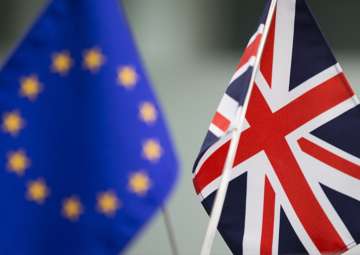Britain is reportedly planning to offer more money to settle its bill with the European Union in a bid to unblock stalled Brexit negotiations — but only if the EU agrees to start discussing a future free-trade deal.
The size of the bill, covering commitments Britain has made while an EU member, is a key sticking point in divorce talks. Britain has previously offered about 20 billion euros ($23 billion), but the EU wants at least 60 billion euros ($70 billion).
British media said Tuesday that the Cabinet’s Brexit committee had agreed to increase the offer to about 40 billion euros ($46 billion).
May’s office declined to confirm the amount, but said that “the U.K. and the EU should step forward together” to unblock the negotiations.
“It remains our position that nothing’s agreed until everything’s agreed in negotiations with the EU,” Downing St. said.
The 27 other EU leaders are due to decide at a Dec. 14-15 summit whether there has been sufficient progress on the divorce terms for talks to move on to future relations and trade. With Britain due to leave the EU in March 2019, U.K. leaders are keen to start work on a free-trade deal with the bloc.
EU chief negotiator Michel Barnier said Monday that, if that is to happen, Britain must come up with solutions on the key issues: the Brexit bill, the status of the U.K. border with EU member Ireland and the rights of citizens affected by Britain’s exit.
Britain, however, says those issues can’t be settled without also discussing future relations.
Brexit Secretary David Davis said Tuesday that “the Brexit talks have been tough” but had made good progress.
“We now must start talking about our future relationship,” he said at a conference in London.
Meanwhile, political instability on both sides of the English Channel is fueling Brexit uncertainty. In Germany, talks on a potential coalition between Chancellor Angela Merkel’s conservatives and two smaller parties have collapsed, raising the prospect of new elections at a crunch time for Brexit talks.
In Britain, May’s minority Conservative government is split between opponents and backers of Brexit, and she faces a battle in Parliament to approve a key piece of legislation.
The European Union (Withdrawal) Bill is designed to prevent a legal vacuum by converting some 12,000 EU laws into British statute on the day the U.K. leaves the bloc in March 2019.
But many lawmakers claim the bill gives the government too much power to amend legislation without parliamentary scrutiny. And opponents of Brexit are trying to amend it to soften the terms of Britain’s exit from the bloc.
Latest World News
